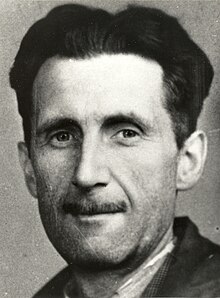George Orwell
(Ümber suunatud leheküljelt Orwellilik)
George Orwell (25. juuni 1903 – 21. jaanuar 1950) oli inglise kirjanik ja ajakirjanik. Tema loomingust on tuntuimad totalitarismivastased romaanid "1984" ja "Loomade farm".
- Kui ma oleksin olukorrast pisut paremini aru saanud, oleksin tõenäoliselt ühinenud anarhistidega.
- Hispaania kodusõja kohta, kirjas sõber Jack Commonile, oktoober 1937

- Iga rida, mille ma alates 1936. aastast olen kirjutanud, on kirjutatud otseselt või kaudselt totalitarismi vastu ja demokraatliku sotsialismi poolt, nagu mina seda mõistan.
- Kirjutatud 1946
- Kõik loomad on võrdsed, aga mõned on võrdsemad.
- Neli jalga hea, kaks jalga halb!
- Iga sõda, kui ta kätte jõuab või enne kui ta kätte jõuab, esitletakse mitte kui sõda, vaid kui enesekaitset mõrvarliku maniaki vastu.
- Every war, when it comes, or before it comes, is represented not as a war but as an act of self-defence against a homicidal maniac.
- Arvustus: F. P. Crozier, "The Men I Killed", New Statesman and Nation, 28. august 1937
- Vaadates maailma tervikuna, pole suundumus aastakümneid olnud mitte anarhia suunas vaid orjanduse taaskehtestamise suunas. Me võime olla teel mitte üleüldise kollapsi suunas, vaid kohutavalt stabiilse ajastu suunas - sellise nagu see oli antiikaja orjanduslikes impeeriumites. Palju on arutatud James Burnhami teooria üle, kuid üksnes vähesed on arvestanud selle ideoloogiliste mõjudega — see on taoline maailmavaade, taolised uskumused ja taoline sotsiaalne korraldus, mis valitseksid tõenäoliselt riigis, mis oli ühtaegu nii vallutamatu kui ka alalises "külmas sõjas" oma naabritega.
- Kui aatompomm oleks midagi nii odavat ning lihtsalt toodetavat nagu jalgratas või äratuskell, siis oleks see meid viinud tagasi barbaarsusesse, või oleks hoopis tähendanud riikliku suveräänsuse lõppu ning viinud tugevalt tsentraliseeritud politseiriigi kehtestamini. Kui aatompomm on aga hoopis haruldane ning kulukas ese — milline ta praegu tundubki olevat —, ning mida on sama keerukas valmistada kui lahingulaeva, siis pigem lõpetab see laiaulatuslikud sõjad pikendades lõputult "rahu, mis pole rahu" seisundit.
- Looking at the world as a whole, the drift for many decades has been not towards anarchy but towards the reimposition of slavery. We may be heading not for general breakdown but for an epoch as horribly stable as the slave empires of antiquity. James Burnham's theory has been much discussed, but few people have yet considered its ideological implications — that is, the kind of world-view, the kind of beliefs, and the social structure that would probably prevail in a state which was at once unconquerable and in a permanent state of "cold war" with its neighbors.
Had the atomic bomb turned out to be something as cheap and easily manufactured as a bicycle or an alarm clock, it might well have plunged us back into barbarism, but it might, on the other hand, have meant the end of national sovereignty and of the highly-centralised police state. If, as seems to be the case, it is a rare and costly object as difficult to produce as a battleship, it is likelier to put an end to large-scale wars at the cost of prolonging indefinitely a "peace that is no peace." - "You and the Atom Bomb", Tribune (19. oktoober 1945). Cit. via: Sonia Orwell, Ian Angus, "George Orwell: The Collected Essays, Journalism & Letters, Volume 4: In Front of Your Nose 1946–1950", 2000, lk 9
- Väljendi "külm sõda" (cold war) esmakordne dokumenteeritud kasutus.
- Looking at the world as a whole, the drift for many decades has been not towards anarchy but towards the reimposition of slavery. We may be heading not for general breakdown but for an epoch as horribly stable as the slave empires of antiquity. James Burnham's theory has been much discussed, but few people have yet considered its ideological implications — that is, the kind of world-view, the kind of beliefs, and the social structure that would probably prevail in a state which was at once unconquerable and in a permanent state of "cold war" with its neighbors.
- Raamatu kirjutamine on jube ning kurnav võitlus nagu mingi pikk ja piinarikas haigushoog. Keegi ei võtaks seda ette, kui ta poleks juhitud deemonist, kellele ei suudeta vastu panna ning keda ei suudeta mõista.
- Writing a book is a horrible, exhausting struggle, like a long bout of some painful illness. One would never undertake such a thing if one were not driven on by some demon whom one can neither resist nor understand.
- "Why I Write", Gangrel (suvi 1946)
- Kui vabadus üldse midagi tähendab, siis tähendab see õigust rääkida inimestele seda, mida nad ei taha kuulda.
- If liberty means anything at all, it means the right to tell people what they do not want to hear.
- Algne eessõna "Loomade farmile"; cit. via: Ian R. Willison, "George Orwell: Some Materials for a Bibliography", 1953
- Ühiskonnas, kus pole seadust ning teoorias sundus puudub, on ainsaks käitumise suunajaks avalik arvamus. Kuid karjaliste loomade tohutu sarnanemistungi tõttu on avalik arvamus vähem sallivam kui mistahes õigusnormistik. Kui inimesi valitseb "sina ei pea mitte", siis jääb indiviidile vabadus teatud kõrvalekaldumisteks; kui neid valitseb aga väidetavalt "armastus" või "mõistlikkus", siis on indiviid pideva surve all käituda ja mõelda täpselt nii nagu kõik teised.
- In a Society in which there is no law, and in theory no compulsion, the only arbiter of behaviour is public opinion. But public opinion, because of the tremendous urge to conformity in gregarious animals, is less tolerant than any system of law. When human beings are governed by "thou shalt not", the individual can practise a certain amount of eccentricity: when they are supposedly governed by "love" or "reason", he is under continuous pressure to make him behave and think in exactly the same way as everyone else.
- "Politics vs. Literature: An Examination of Gulliver's Travels, Polemic, september/oktoober 1946